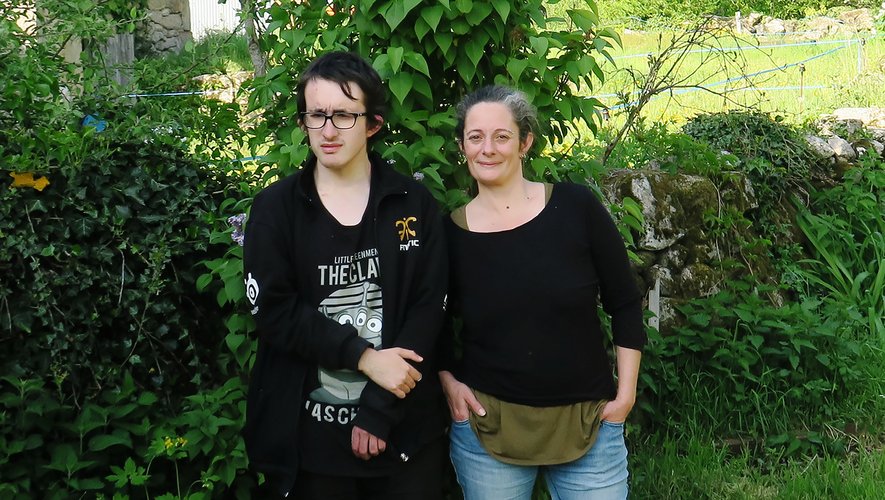Corentin is 24 years old. This young Lotois was diagnosed with Asperger’s autism at the age of 18. An obstacle course for his mother, Sylvia. The latter, to raise awareness of autistic disorders, testifies to their daily lives.
“As a child, Corentin was a little on the fringes of his contemporaries, he went towards others but he did not have the codes. He was very, even too much, spontaneous”, confides Sylvia Broussouloux. This Lotoise is the mother of Corentin. Now 24, he was diagnosed with Asperger’s Autism when he was 18.
Read also :
TESTIMONY. The life of Joey, a young autistic Lot, turned upside down at his majority
Yet, from an early age, her mom saw the signs. “In large section, he wrote in mirror. Writing in stick has always caused fatigue in him. He also has vision problems, he does not see in 3D, but also attention”, continues Sylvia. But also sensory disturbances. His son, his first child at the time, is followed by the CMPP (Centre médico-psycho-pédagogique) for all his difficulties. When he arrives in CE1, the decision is made: Corentin will follow the instruction at home. “At school, he was in a bad state. He was often the scapegoat of other children. He was constantly teased, he was put aside”, regrets the mother. If home education (IEF) allows her son to get better, Sylvia always has the feeling that there was something else. “At the time, I was not heard. I was told that these were psychological disorders that could not be named in children. At the level of fine motor skills, I was told that these were cramps”, sighs Sylvia.
“We know how to adapt”
The trigger comes from the testimony of a young autistic adult on whom the mother falls. “I found a lot of similarities between him and Corentin,” she says. She decides to make an appointment at the CRA (Centre Ressources Autisme) in Toulouse in 2016. The assessment is made in 2017, almost a year later. Corentin is 18 years old and the diagnosis is clear: he has Asperger’s autism, without intellectual disability. An evaluation welcomes as a “relief” in his family. Sylvia explains: “now we know how to adapt better. We often ask the atypical to adapt when it takes a lot of effort, we should do the opposite”.
Read also :
Lot: CRI 46 and Ceresa have been fighting for the opening of a structure for autistic adults for 10 years
Corentin still lives with his mother, his stepfather with his half-brothers. “Autonomy remains relative. Corentin is always thinking, he can put himself in danger without being aware of it. He is in his thoughts every day, a bit like adding fuel to the fire”, slips Sylvia. The latter has put a stop to her activity as an author photographer to take full care of her children. Corentin is followed by the SAMSAH TSA service of the APEAI of Figeac as well as Lot Aide A Domicile. “Besides that, my companion and I are his family caregivers. We manage Corentin’s needs 24 hours a day. In the house, we are creating a dedicated room for them. The idea is to develop his autonomy: learning to manage your space…”, describes the mother.
Raising awareness of respect and tolerance
Corentin has a favorite area – like many children with Asperger’s Syndrome who have particular activities and interests. His ? Computing. The young adult has followed many distance training courses: community manager, coding but also 3D printing with the FabLab. “He would like to work as a freelancer in IT,” smiles Sylvia. And even if the young boy has Asperger’s syndrome, he is developing his social skills. He participated in the Toulouse GameShow with a friend, goes regularly to the seniors’ club in Sousceyrac, volunteers once or twice a month for the Restos du Coeur.
Read also :
Autism, a still misunderstood disorder
For Sylvia, the fight continues. “It’s an obstacle course. You have to make typical people aware of respect and tolerance,” she explains. “The gaze of others can still be difficult for him to manage. Either he feels accepted or he goes his own way. Awareness of invisible disabilities is important, there are so many different autistic disorders that exist”, continues the mother. Two of Corentin’s brothers also have neurodevelopmental disorders. One of them, aged 13, will be received at the CRA. For the second, 4 years old, it is a little early to diagnose him, even if the mother detects some signs in him, such as problems with laterality or sensory disturbances. Sylvia has, moreover, noted an evolution in the management of autism: “a good number of doctors are more attentive. We realize that there is an awareness, even if some do not are not well trained in these neurological disorders”. Sylvia is constantly learning. Just to adapt as much as possible to his sons and offer them a better quality of life.

